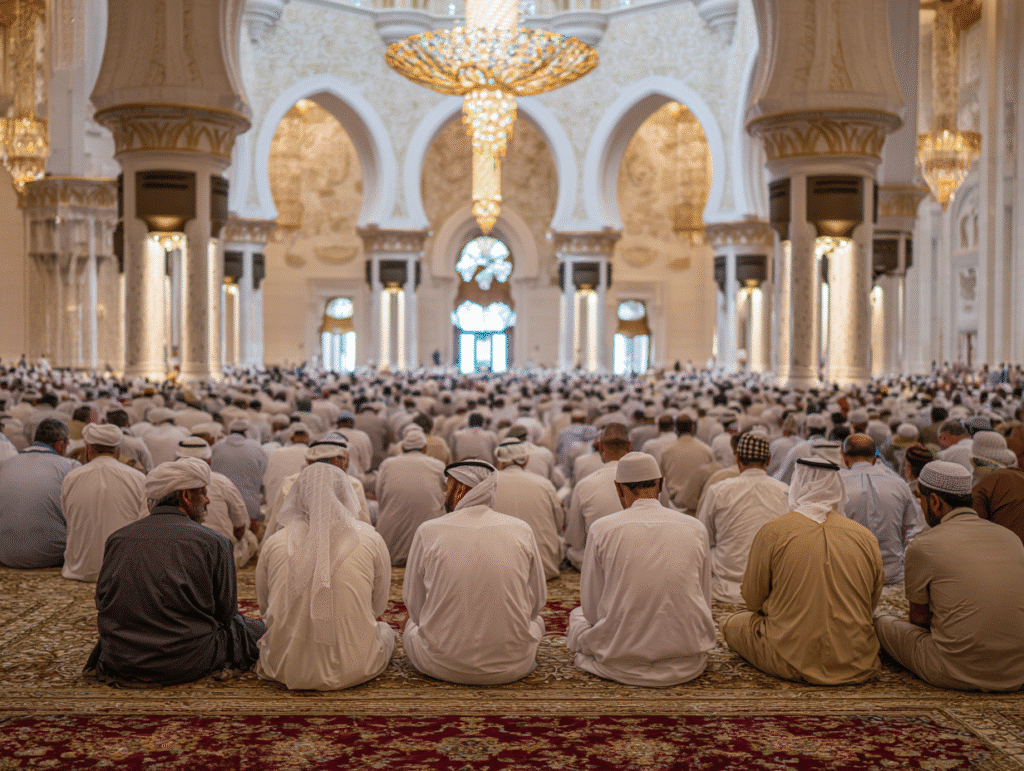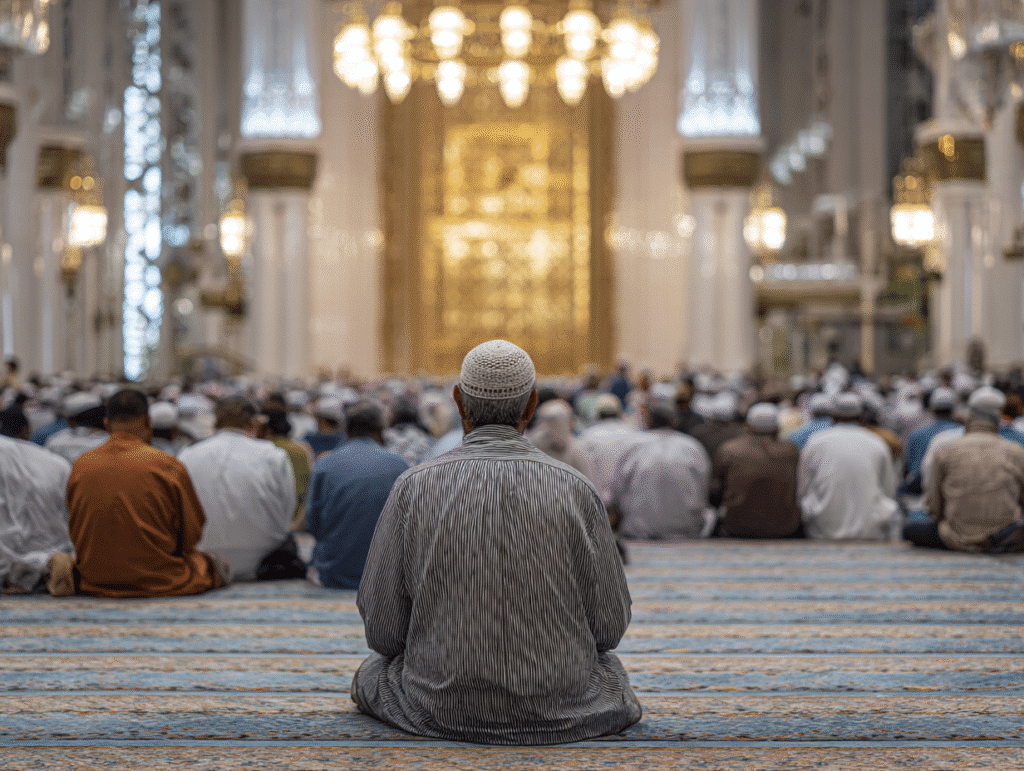Prayer Time Dubai matters every single day. Accurate timings guide worship, routine, and community. This guide explains today’s schedule, monthly tables, calculation rules, and practical tips. You will plan with clarity. You will pray with confidence.
| Prayer | Time |
|---|---|
| Fajr | 05:25 |
| Sunrise | 06:42 |
| Zuhr | 12:36 |
| Asr | 15:56 |
| Maghrib | 18:21 |
| Isha | 19:51 |
| Zawal | 05:25 |
| Next Prayer | Fajr — 05:25 |
| # | Day | Month | Fajr | Sunrise | Zuhr | Asr | Maghrib | Isha | Zawal |
|---|---|---|---|---|---|---|---|---|---|
| 1 | Sunday | March | 05:25 | 06:42 | 12:36 | 15:56 | 18:21 | 19:51 | |
| 5 | Thursday | March | 05:22 | 06:38 | 12:35 | 15:57 | 18:23 | 19:53 | |
| 10 | Tuesday | March | 05:17 | 06:31 | 12:32 | 15:57 | 18:27 | 19:57 | |
| 15 | Sunday | March | 05:12 | 06:28 | 12:33 | 15:58 | 18:28 | 19:58 | |
| 20 | Friday | March | 05:07 | 06:23 | 12:31 | 15:57 | 18:31 | 20:01 | |
| 25 | Wednesday | March | 05:01 | 06:18 | 12:30 | 15:56 | 18:34 | 20:03 | |
| 31 | Tuesday | March | 04:55 | 06:12 | 12:28 | 15:55 | 18:37 | 20:05 |
| Prayer | Time |
|---|---|
| Fajr | 04:50 |
| Sunrise | 06:10 |
| Zuhr | 12:26 |
| Asr | 15:53 |
| Maghrib | 18:36 |
| Isha | 20:06 |
| Zawal | 04:50 |
| Next Prayer | Fajr — 04:50 |
| # | Day | Month | Fajr | Sunrise | Zuhr | Asr | Maghrib | Isha | Zawal |
|---|---|---|---|---|---|---|---|---|---|
| 1 | Wednesday | April | 04:50 | 06:10 | 12:26 | 15:53 | 18:36 | 20:06 | |
| 5 | Sunday | April | 04:48 | 06:08 | 12:26 | 15:53 | 18:38 | 20:08 | |
| 10 | Friday | April | 04:45 | 06:05 | 12:25 | 15:52 | 18:41 | 20:10 | |
| 15 | Wednesday | April | 04:42 | 06:02 | 12:24 | 15:51 | 18:44 | 20:12 | |
| 20 | Monday | April | 04:38 | 05:59 | 12:24 | 15:51 | 18:47 | 20:15 | |
| 25 | Saturday | April | 04:35 | 05:56 | 12:23 | 15:50 | 18:50 | 20:18 | |
| 30 | Thursday | April | 04:31 | 05:53 | 12:23 | 15:50 | 18:53 | 20:20 |
| Prayer | Time |
|---|---|
| Fajr | 04:18 |
| Sunrise | 05:42 |
| Zuhr | 12:19 |
| Asr | 15:45 |
| Maghrib | 18:48 |
| Isha | 20:20 |
| Zawal | 04:18 |
| Next Prayer | Fajr — 04:18 |
| # | Day | Month | Fajr | Sunrise | Zuhr | Asr | Maghrib | Isha | Zawal |
|---|---|---|---|---|---|---|---|---|---|
| 1 | Friday | May | 04:18 | 05:42 | 12:19 | 15:45 | 18:48 | 20:20 | |
| 5 | Tuesday | May | 04:14 | 05:40 | 12:19 | 15:45 | 18:52 | 20:22 | |
| 10 | Sunday | May | 04:09 | 05:36 | 12:19 | 15:44 | 18:55 | 20:25 | |
| 15 | Friday | May | 04:06 | 05:34 | 12:19 | 15:43 | 18:58 | 20:28 | |
| 20 | Wednesday | May | 04:02 | 05:31 | 12:19 | 15:43 | 19:00 | 20:30 | |
| 25 | Monday | May | 03:59 | 05:30 | 12:19 | 15:42 | 19:02 | 20:33 | |
| 31 | Sunday | May | 03:58 | 05:29 | 12:16 | 15:40 | 19:04 | 20:26 |
For a complete practical guide to life in the Emirates, explore our full Living in the UAE hub.
Today at a glance
Dubai’s calendar blends solar movement and civic rhythm. The five daily prayers follow the sun’s arc. Fajr starts before sunrise. Dhuhr begins after solar noon. Asr follows the afternoon shadow rule. Maghrib begins at sunset. Isha starts after twilight fades. Zawal marks solar noon’s transition. It signals Dhuhr’s approach.
Your daily list should include minutes for wudhu. It should include a margin for travel. It should include time for calm. Use alarms that respect each interval. Place one reminder ten minutes before the adhan. Place another at the exact adhan.
How official timings are set
Authorities calculate timings with astronomical data. The angle of the sun below the horizon sets Fajr and Isha. Solar noon sets Dhuhr. The changing shadow length defines Asr. Sunset fixes Maghrib. These numbers adjust daily. They also adjust by month.
Dubai’s civic bodies publish official tables. Mosques advise according to those tables. Respect the published set for consistency. Families should keep one trusted source. Teams should agree the same list.

Understanding the Asr rule
Asr depends on your madhhab. One school uses a shadow length equal to an object’s length. Another uses twice the length. Dubai’s printed tables typically follow the one-shadow rule. Check your mosque noticeboard to confirm. Choose your rule and keep it stable. Do not switch methods midweek. Consistency protects your schedule.
Zawal and its purpose
Zawal marks the period around solar noon. Avoid praying voluntary rak‘ahs at exact Zawal. Use those minutes for dhikr. Use them for reading. Use them for quiet focus. When the Zawal window passes, Dhuhr starts. You may then pray.
Reading the monthly timetable
Monthly lists help planners. Scan the left column for dates. Read across for Fajr, Sunrise, Dhuhr, Asr, Maghrib, and Isha. Note gradual shifts across weeks. Fajr drifts later through September. Maghrib creeps earlier by minutes. Copy your week into a phone note. Share it with family or a work chat.
Timetables often include Zawal. Treat it as your Dhuhr anchor. Place your first Dhuhr alert two minutes after Zawal. That buffer respects calculation rounding.

Practical planning for busy days
Stack tiny habits. Place your prayer mat near the door. Keep a travel wudhu kit in your bag. Save a clean microfibre towel. Mark prayer rooms on your regular routes. Many malls provide calm, clean spaces. Add their locations to a map list.
Hydrate early. Avoid sprinting straight from heat to prayer. Give your body one minute to settle. Breathe slowly before takbir. Short pre-prayer rituals build presence.
Workday strategies that actually help
Block your calendar for Dhuhr and Asr. Colleagues respect transparent blocks. Use clear labels like “Prayer break.” Keep blocks short and consistent. Five to ten minutes can work at the office. Extend time on longer days if needed.
If you manage a team, share weekly times on Monday. Offer gentle reminders, not pressure. Provide a neutral space for prayer. Respect privacy. Culture improves when practice feels normal.
Travel, traffic, and edge cases
Dubai moves quickly. Traffic can surprise you. Keep a small spray bottle for wudhu. Carry socks suited for masah if relevant. Save a backup plan. Identify two mosques near each appointment. Mark one alternative in case of closures. If time compresses, pray the earliest valid time. Aim to avoid the last minutes of each window.
Day trips to Sharjah or Abu Dhabi shift times slightly. Mountains and coastline adjust horizon cues. Always refresh the day’s list by location. Do not rely on yesterday’s city.

Ramadan, Taraweeh, and night cadence
Ramadan changes the evening rhythm. Maghrib becomes Iftar’s signal. Isha leads smoothly into Taraweeh. Prepare suhoor with the Fajr margin in mind. Set a final Fajr alarm. Keep a second warning five minutes earlier. That warning protects against clock drift or grogginess.
During Ramadan, pace water intake with prayers. Small sips at Maghrib help digestion. Larger intake after Taraweeh helps recovery. Sleep in defined blocks. Anchor the blocks to Fajr and Isha.
Friday, Jumu‘ah, and timing
Friday replaces Dhuhr with Jumu‘ah. Mosques fill quickly near business districts. Aim to arrive early. Choose the first rows if you can. Keep movement calm. Phones should remain silent. After prayer, leave space for those entering sunnah quickly. Courteous exits help the next group.
If you cannot attend Jumu‘ah, pray Dhuhr at its time. Respect the rules of your workplace. Communicate needs before Friday arrives.
Technology that supports devotion
Use one reliable prayer app. Enable Dubai location permissions. Select the correct calculation method. Confirm your Asr rule. Turn on pre-adhan reminders. Create a home screen widget if available. Consider a small smartwatch alert. Subtle taps reduce phone handling during meetings.
Sync monthly tables with your calendar. Colour-code each prayer. Add addresses for your regular mosques. One-tap directions save minutes under pressure.

Qibla direction and compass tips
Phones support Qibla direction with sensors. Calibrate your compass in open areas. Avoid steel lift lobbies and heavy speakers. Watch for interference from thick cases. Confirm once with a physical compass if possible. Mark fixed spots in your home. That little sticker removes daily friction.
Etiquette inside the mosque
Keep voices low even outside the hall. Place phones on silent before you enter. Avoid blocking doorways after prayer. Step aside quickly to finish dhikr. Leave the front rows tidy. Straighten a mislaid mat. These small acts help many people, not just you.
Dress with care. Light fabrics help in summer. Keep socks fresh for long workdays. Respect shared space. Carry a spare mask if needed.
Teaching children the rhythm
Children learn through rhythm and joy. Show times on a fridge board. Let them tick each prayer. Praise effort. Keep expectations kind. Invite questions about timing and meaning. Read short stories about the adhan. Visit a mosque early on quiet days. Build positive associations first.

Health, hydration, and comfort
Heat and AC both affect hydration. Sip water after each prayer. Use lip balm in dry rooms. Keep a small moisturiser to avoid irritation during wudhu. Choose breathable fabrics. Keep a spare undershirt at work. Comfort supports presence.
If you feel unwell, sit where needed. Health remains a trust. Seek shade when heat spikes. Ask for help without hesitation.
Accuracy and small margins
Clocks can drift by a minute. Phones can show slight differences. Build a small margin into your routine. Do not pray Fajr before its time. Do not miss Maghrib by seconds through delay. Aim for calm punctuality, not frantic arrivals. Check watches against a trusted source weekly.
Using today and the month together
Start each morning with the daily list. Note Fajr, Sunrise, and Maghrib first. Those three anchor the rest. Scan the monthly table on Sunday night. Adjust recurring alarms by one or two minutes. Share the changes with your family group. A tidy schedule frees the mind for worship.
Your weekly review
End the week with a short review. Which day felt tight? Where did travel compress Asr? Adjust next week’s plans now. Small reviews create steady progress. Prayer becomes the day’s structure, not an interruption.



